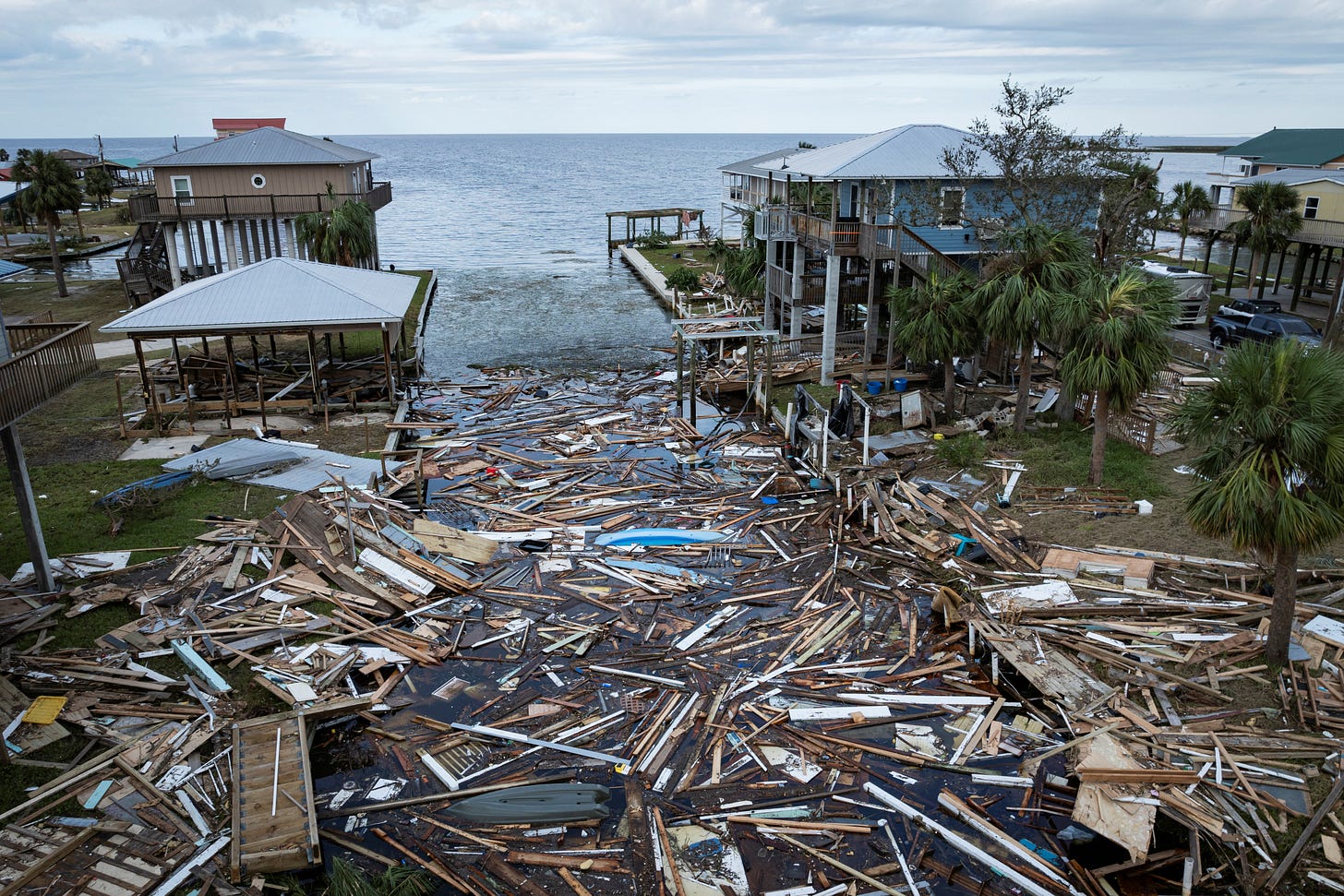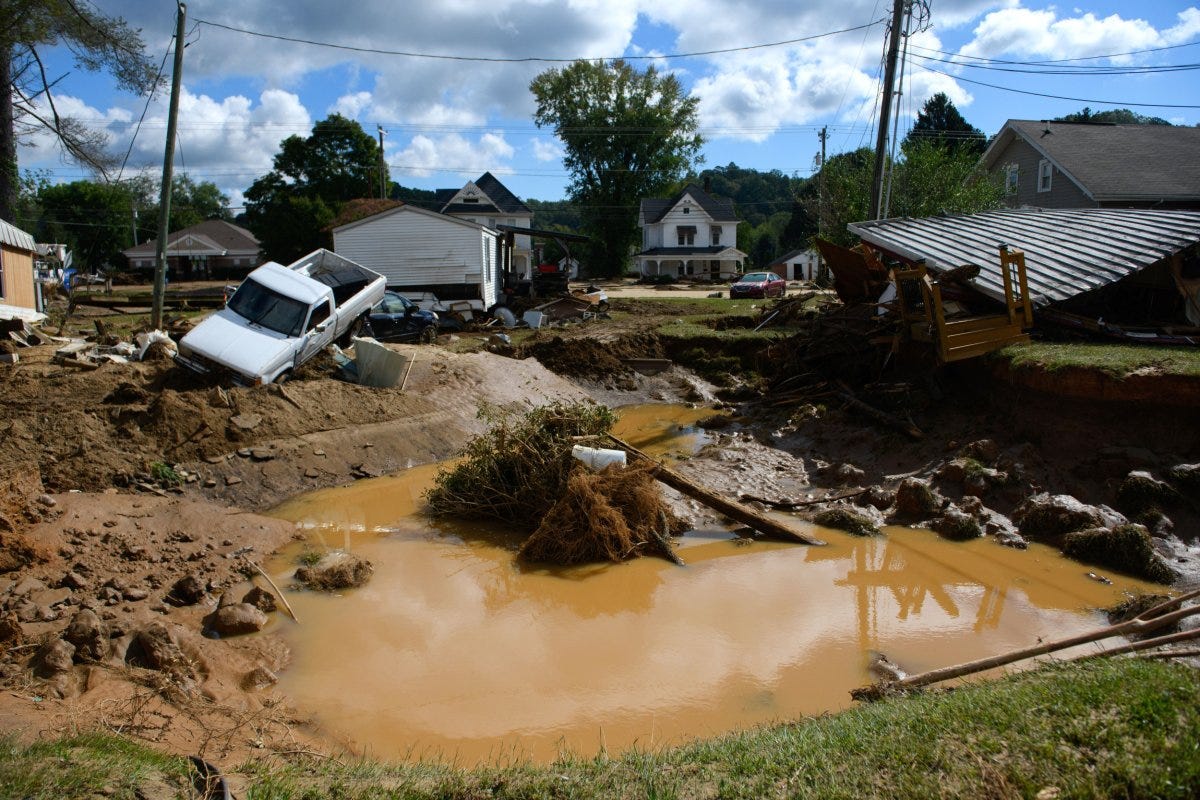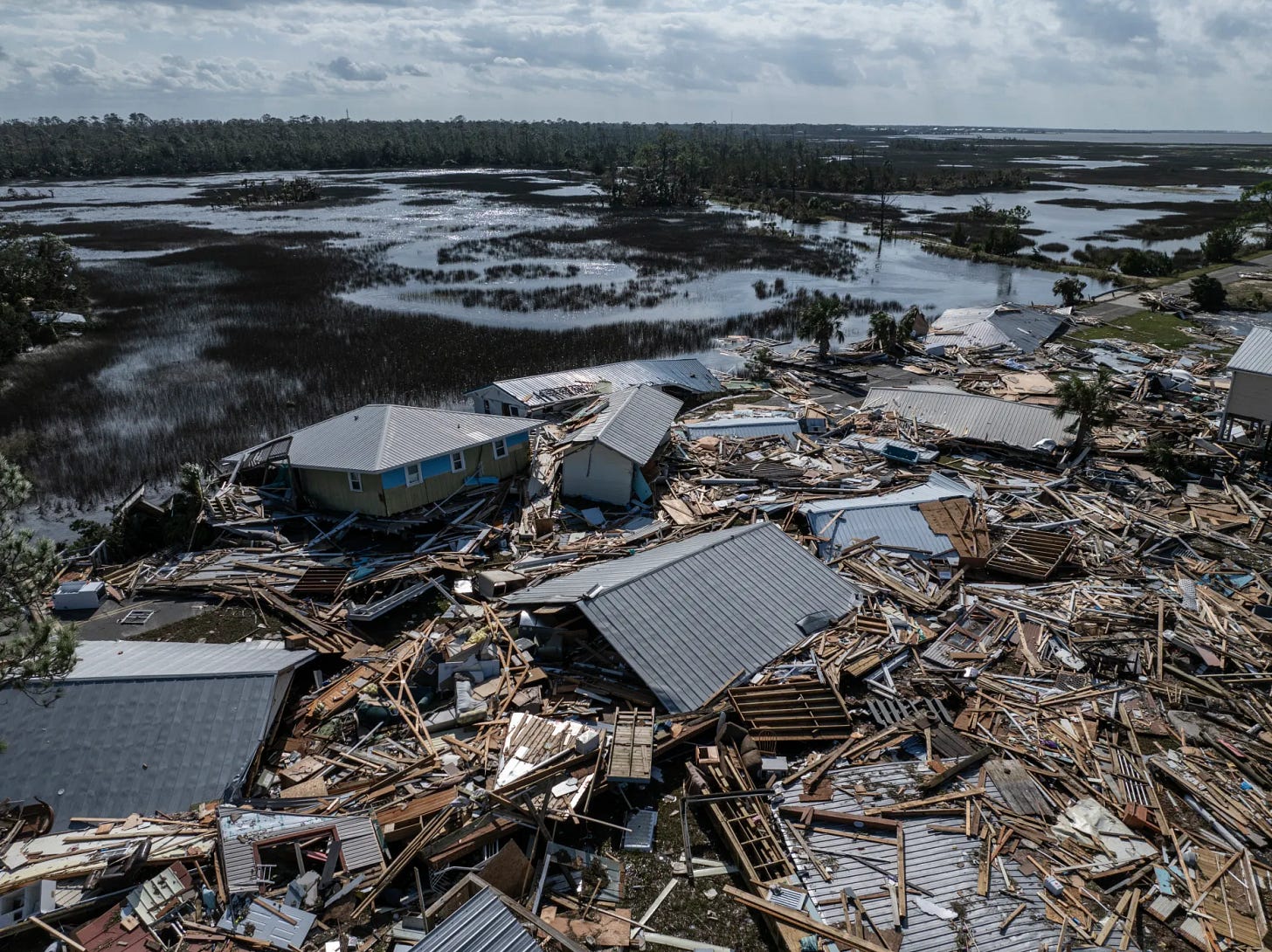Misinformation is Hurting Hurricane Helene Victims
Here’s the truth about FEMA and disaster relief
In the wake of Hurricane Helene, as the rain finally began to clear and residents across multiple states grieved the loss of their homes, community, and even their neighbors, the rumors began.
“The federal government isn’t sending aid.”
“All the money for Americans has been sent to migrants.”
The misinformation went viral, and as it spread, those most affected by Hurricane Helene were the ones hurt the most. The storm completely wiped away some communities. Over 230 people were killed across the Southeast, and people in small mountain communities were left totally isolated, without access to communication, electricity, cell service, or clean water. It is one of the worst natural disasters to ever hit the United States.
I have been receiving non-stop questions about these rumors. Here are some facts and information about how you can help.
Rumor: FEMA doesn’t have enough money because it went to migrants or Ukraine
The Federal Emergency Management Agency (FEMA) is a government agency that helps the US prepare for and respond to disasters that happen on US soil. FEMA is funded by Congress as part of the Department of Homeland Security’s regular funding. Part of that funding goes into the Disaster Relief Fund, which is designated for emergency expenses such as housing, food and water, search-and-rescue, and more during natural disasters, such as hurricanes, wildfires, and flooding.
FEMA funding is separate from any foreign aid the US gives to other countries. This means none of FEMA’s money is being sent for aid to US allies like Ukraine or Israel. Another important point is that when the US gives money to places like Ukraine or Israel, it is almost always in the form of weapons. When the headlines say “US to give $30 Million to Ukraine,” that most often means the US is giving weapons worth $30 million.
In August, Congress passed a short-term government spending bill to avoid a shutdown. This bill included $20 billion to extend FEMA funding through Dec. 20, but it did not provide any extra disaster funding, which some lawmakers had asked for.
The Secretary of Homeland Security Alejandro Mayorkas said last week that FEMA has sufficient funds to cover the Hurricane Helene disaster, but they may run out of funding before the end of hurricane season.
In order to get FEMA more money at this point, Congress would have to reconvene. Congress is currently on a recess until after the election.
After a bipartisan group of Congresspeople from affected states wrote to Congressional leadership, saying Congress needs to meet sometime this month in order to discuss the funding issue, Speaker of the House Mike Johnson said Congress will not return before the November election because it will take time to assess the damage and calculate the costs of rebuilding. He said, “We wouldn’t even conceivably have the request ready before we get back in November. There’s no necessity for Congress to come back.”
On Monday, Oct. 7, the White House said FEMA has "sufficient funding to both support the response to Hurricane Milton and continue to support the response to Hurricane Helene -– including funding to support first responders and provide immediate assistance to disaster survivors."
Rumor: FEMA isn’t even in NC
Again, not true. The North Carolina government said this week that:
More than $27 million FEMA individual assistance funds (funding provided directly to households, we talk more about this below) have been paid so far to Western NC disaster survivors
More than 83,000 people have registered for individual assistance
Nearly 1,400 people are now housed in hotels through FEMA’s Transitional Sheltering Assistance
More than 755 FEMA personnel are on the ground assisting in western NC – they are doing search and rescue, providing rapid access to relief resources, and meeting with disaster survivors in shelters and neighborhoods
FEMA also says that more than 3,000 North Carolina residents have been rescued or supported by their search and rescue efforts, with help from the National Guard.
Rumor: The current administration “isn’t doing anything.”
This is not true. On Sunday, Georgia Governor Brian Kemp confirmed he spoke to President Biden and that Biden asked him, “Hey, what do you need?” White House Homeland Security adviser Liz Sherwood-Randall also confirmed the call between Biden and Kemp.
Republican governors in South Carolina and Georgia have both praised the government’s response, with South Carolina Governor Henry McMaster calling the response “superb.” McMaster said in a press conference last Tuesday that he had spoken to Biden, Transportation Secretary Pete Buttigieg, and the administrator of the Federal Emergency Management Agency (FEMA).
The White House reports that more than 6,100 National Guardsmen and more than 7,000 Federal personnel are on the ground in affected areas. In a statement on Oct. 6, the White House said, “Over the last several days, the Administration has contacted nearly 450 state, city, and county officials in impacted states to ensure they have the support and resources they need.”
The US Department of Transportation’s Federal Highway Administration (FHWA) also announced:
The immediate availability of $100 million in Emergency Relief funds for the North Carolina Department of Transportation to help pay for the costs of immediate emergency work
$32 million for the Tennessee Department of Transportation
$2 million for use by the South Carolina Department of Transportation
And North Carolina is not the only place FEMA has been helping. So far, they have:
Provided more than $137 million in assistance total to six states
Sent 7,000 federal personnel
Distributed 15 million meals and 14 million liters of water
Installed 157 generators at critical facilities including hospitals and water treatment plants
Rumor: FEMA is only giving $750 to victims of the storm
This is not true. First of all, it's not only $750, that's only one kind of assistance. There are many other kinds of assistance that people can apply for as well, and that is only counting the federal response. It doesn't include nonprofit responses or state government responses.
The $750 from FEMA is for essential, immediately-needed items (food, diapers, medication, formula, etc). There are other forms of assistance such as temporary housing or home repair costs, that people can also apply for, while the $750 is for their immediate short term needs. This money is not a loan, and does not need to be paid back. Not everyone qualifies, though – you have to be able to prove your identity to FEMA, and in some cases, you have to demonstrate that your homeowner’s insurance has denied your claims.
I agree that Congress should increase the FEMA per household funding. The $750 Congress has set might not go very far, especially when there is such destruction. But the way budgets work at the federal government level, money is appropriated by Congress for specific purposes. They put a dollar amount of what will go to FEMA and what will go to Ukraine, what will go to Social Security, etc.
The executive branch is in charge of carrying out the laws the legislative branch makes. The executive branch cannot just decide, "Actually, let's double FEMA funding."
People are quite understandably upset, because what happened during Helene is horrific, and it will take years to recover from it.
And it is frustrating that Congress is essentially saying, “We are too busy campaigning to help you, sorry.” I agree that it seems like a slap in the face when people are legitimately hurting so badly through no fault of their own.
But we also need to understand the real facts:
Congress (the legislative branch) specifically appropriates funds for things.
It's the job of the executive branch to distribute those funds.
FEMA says they think they have enough funding to cover what will be needed for Helene cleanup, but they might run out before the end of the hurricane season if the rest of the season is bad.
The Speaker of the House says he has no plans to reconvene Congress to increase FEMA funding.
The $750 Serious Needs Assistance grant is not the only FEMA funding someone can apply for, and there are more state and nonprofit programs as well.
You can simultaneously think Congress should allow FEMA to increase its per household emergency funding while also understanding how budgets work.
You can know that Congress specifically funds things via laws and that the executive branch cannot rewrite laws and also think Congress should be doing more to help hurricane victims. It's not either/or.
Rumor: FEMA is blocking other organizations from helping in North Carolina and seizing land
This is categorically false. I personally am in contact with two different nonprofit organizations, World Central Kitchen and Convoy of Hope, that are operating in NC. They are just two of many (list of other organizations below).
FEMA cannot, and is not, seizing property or land. Applying for disaster assistance does not mean the government then owns your land. A FEMA official may come to verify the damage and help determine what kind of assistance you need. In extreme cases, FEMA may say your home is uninhabitable. In that case, they will determine how much assistance you need to make it “safe, sanitary, and functional.”
Truth: Outrage isn’t activism.
FEMA’s administrator called the rumors “just plain false” and “truly dangerous.” She said it is “a shame that people are sitting home on their comfortable couches while we have thousands of people here on the ground that have left their own families to be able to help those in need.”
And she’s right. Spreading false information actively harms people who need help by diverting resources and attention away from the actual issue.
Helping people in dire need is not about running your mouths. It's about moving your hands and feet. For some of us that will look like raising and donating money. For others, it might be unpacking trucks or delivering aid or medical care. For some of us whose resources differ, it might mean amplifying the work of people who are actually helping.
So here are some ways you can really make a difference:
If you were personally affected by Helene, you can apply for assistance here.
The Red Cross is accepting donations and volunteers. They also have resources for people affected, including how to recover from a hurricane financially and mentally, and how to stay safe afterwards.
Beloved Asheville is a nonprofit working to deliver free food, water, and supplies. They are accepting donations in Asheville or you can donate online.
World Central Kitchen is serving free meals in FL, GA, NC, and Tennessee.
States have set up their own relief funds, including the Florida Disaster Fund.
North Carolina has set up a website to provide information and resources to North Carolina residents and visitors who were affected. They have a whole page dedicated to places to donate and also have their own NC Disaster Relief Fund you can donate to.
South Carolina’s Emergency Management Division also has a site full of information on where to donate money, clothing, and food.
Georgia's Emergency Management and Homeland Security Agency has information on how to apply for individual assistance.
I think most people here really do want to make the world a better place. And change can happen when we all collectively commit to ending the outrage cycle that yields no good fruit, and commit to trying to help in whatever way we can.
Governerds have already raised more than $500,000 for Convoy of Hope, and you can make your tax deductible contribution here.
Are there more questions I can answer on this topic?






Thank you Sharon! My emergency management colleagues and I are working 12-16 hour days 7 days a week (FEMA is at 24/7 operations) to get all Helene survivors and communities everything they need to start rebuilding their lives and homes and businesses. This misinformation has started to transition into threats against us and we’ve been given safety and security briefs to keep ourselves safe from outraged people while we’re doing this important work. Grateful to everyone in this community who can help dispel the misinformation and keep us safe while we keep going for Americans in the southeast. ❤️
Thank you Sharon for laying out the facts. (A ncarolinian here). Another problem is one of the presidential candidates is fueling this misinformation and the people who need to read this, won't. Or won't believe it. I will try my best to share these facts. It's so awful to see these falsehoods hurting our state when people are suffering. Thank you again. Let's spread the truth and help people of Western NC!